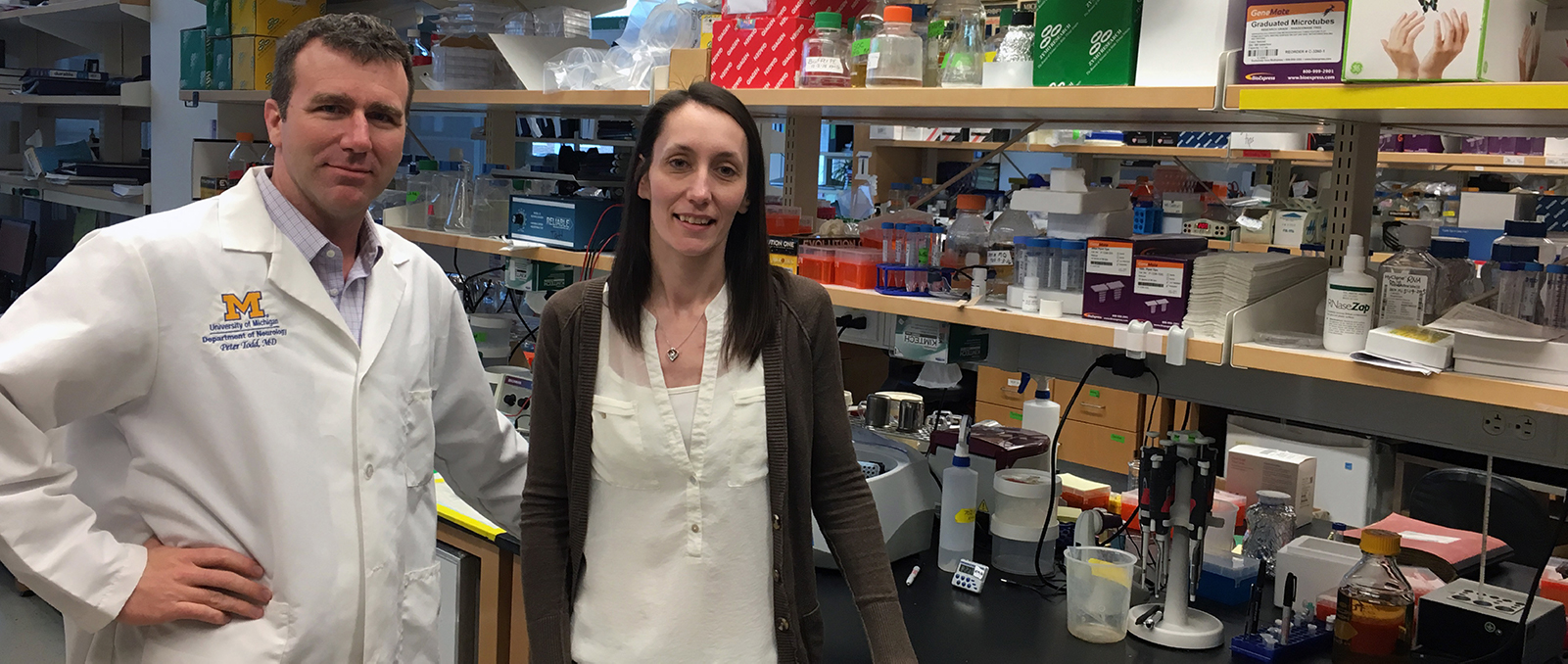
Targeted transcriptional reactivation of FMR1 in Fragile X Syndrome stem cells
FRAXA Grant
Peter Todd MD, PhD
Principal Investigator
Jill Haenfler PhD
Postdoctoral Fellow
University of Michigan Medical Center
$45,000 in 2016
renewed for $45,000 in 2017
Swimming Upstream
Fish like salmon are born in fresh water streams and rivers.
When the time comes for them to breed, they return to the stream of their birth to lay eggs in the same spot where they were born. To accomplish this, they must swim upstream against the current or flow of the stream.
Taking a page out of the salmon DNA playbook, University of Michigan scientists Peter Todd, MD, PhD, and postdoctoral fellow Jill Haenfler, Ph.D., are exploring unchartered waters to find a cure for Fragile X Syndrome. The researchers are adapting CRISPR research to reactivate the FMR1 gene, which provides instructions for making a protein called FMRP — needed for normal brain development. CRISPR, pronounced “crisper”, is a new and innovative technique to cut and paste DNA in human cells.
“Previous Fragile X research has focused on the consequences of a loss of FMRP” said Todd, an assistant professor in the Department of Neurology in the University of Michigan Medical School. “We are trying to intervene at the first event which leads to Fragile X Syndrome, which is the turning off of the Fragile X gene. If we can selectively turn this gene back on and make more FMRP in Fragile X patients, then we would have a really promising new treatment strategy.”
For their efforts, FRAXA is awarding the researchers $90,000 in a post doctoral fellowship grant over two years to reactivate FMR1 in Fragile X Syndrome stem cells. New developments in patient derived stem cells at UM’s MStem Cell Laboratories are at the core of their research.
“If we can show this works in patient cells, then it will suggest our methodology is sound and that such a strategy could be viable in patients if we can get the delivery right” said Todd, the grant’s lead investigator. “If we get the gene to work the way it is supposed to work, it will bypass a whole set of problems that occur when you try to fix the downstream consequences of losing FMRP.”
Todd said their research goal is to create new knowledge and approaches. If all goes well, the research will transition into more complicated systems within the next two years.
”Our best possible solution is to make more FMRP in Fragile X patients by selectively figuring out how to turn the gene back on,” Todd said. “We will be going as far upstream as possible.”
Also like salmon, this new line of research is really a return by Dr. Todd to his scientific “birth place”. After earning his BS in 1994 from the University of California, San Diego, he moved to the University of Wisconsin where he pursued a combined doctoral and medical degree (which he received in 2004). His PhD research focused on the synaptic defects that develop in Fragile X Syndrome, and his first ever research grant (given to his mentors Ken Mack, MD, PhD, and Jim Malter, MD) was an award from FRAXA that helped support his thesis work. “That grant made a big impact on my career and really helped launch my interest in working on Fragile X-associated disorders. I don’t know if I would still be in the Fragile X field today without that early support.”
After completing neurology residency, Dr. Todd came to the University of Michigan, where he joined the U-M faculty in 2010 as an assistant professor in Neurology. His other research is focused on Fragile X–associated tremor/ataxia syndrome (FXTAS), an “adult onset” neurodegenerative disorder typically affecting males who have a shorter repeat in their Fragile X gene. His studies on FXTAS led him back to Fragile X Syndrome and trying to think of new approaches to this currently untreatable disease. As a neurologist, he sees adult patients with both Fragile X Syndrome and FXTAS at the University of Michigan Fragile X Clinic, which he co-directs.
Dr. Todd describes his research work as “very challenging,” yet “fascinating.”
“I love what I do,” he said. “I picked a research area that is hard but important because it gives me the opportunity to do something that is transformative and make a real difference in the lives of others. It’s exhilarating.”
Just like swimming up stream.
Written by
Theodore Coutilish, MA
FRAXA Board Member
Theodore Coutilish a distinguished leader in marketing communications, serves as the Assistant Director of Strategic Engagement and Communications at the University of Michigan. Dedicated to advancing Fragile X research and awareness, he has long advocated for this cause, motivated by his son, Andrew, who has Fragile X syndrome. Residing in Grosse Pointe Shores, Michigan, with his wife, Mary Beth Langan, Theodore earned a BA in Print Journalism from Wayne State University and an MA in Communications from the University of Detroit Mercy.


